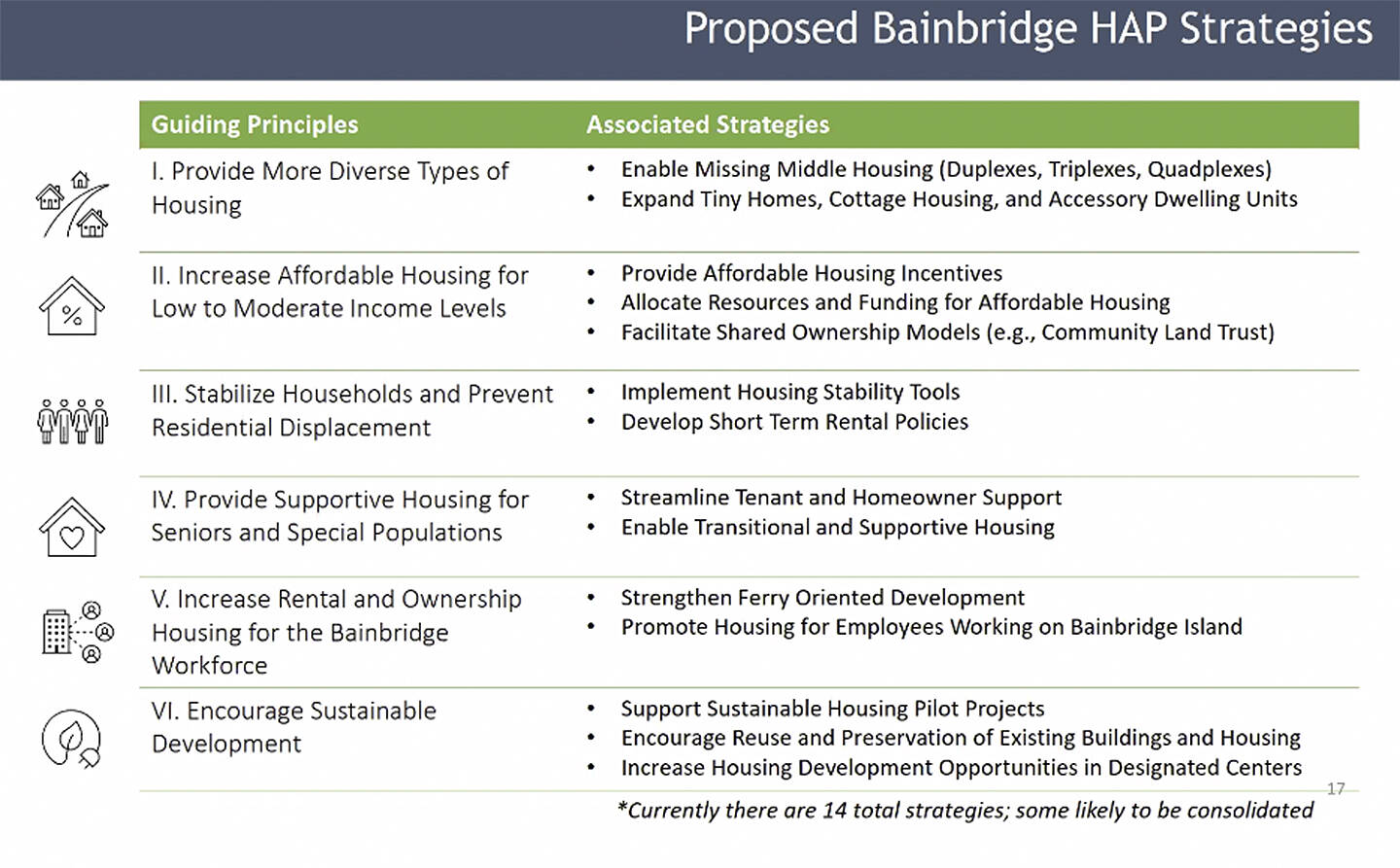Planning Commissioner Peter Sullivan wasn’t afraid to ask about the elephant in the room.
He said the upcoming draft of the Bainbridge Island Housing Action Plan looks like it’s encouraging new development more than other options.
He spoke at the BI Planning Commission meeting March 9 as city planning manager HB Harper presented an early draft by consultant ECONorthwest.
The planning commission will discuss the draft when it’s finished and make recommendations to the City Council.
Harper said government has more control over new development so that’s why it may look like the HAP leans that way. “Code we can change for new development,” she said.
Other factors, which involve free market, are harder to control.
Sullivan suggested things like lowering the cost of living could help people stay in their homes. He mentioned things like solar power and electric bikes.
But City Councilman Jon Quitslund, the liaison to the commission, said some people don’t want to stay in their homes but do want to stay on BI. People, like seniors, want to downsize, but they don’t have options. For those who do want to stay in their homes, increased taxes and other rising costs are issues regarding displacement.
Planning Commissioner Ariel Birtley said the draft does not look at social equity services such as access to child care, transportation and health care. “We have a severe childcare shortage on the island.”
But Harper said getting into that detail would be “scope creep.” She did say the final draft will have more detail, and bringing more affordable housing here will likely bring more of those services to the island.
Commissioner Yesh Subramanian said ECONorthwest should come up with a plan to address critics who always have the same questions. “You need to put them at ease,” he said.
Harper said the city is on a quick timeline, seeking council’s approval this spring. Subramanian’s idea could move it along faster. “How will it change their life?” is what they want to know, he said of critics, adding, for example, that development would double the number of cars on the road. ECONorthwest needs to have an answer for that.
Sullivan said the early HAP draft looks like it’s “drowning in suggestions.” He hopes ECONorthwest will “address low-hanging fruit that will provide the easiest and biggest bang for the buck” so there will be success early on.
The ECONorthwest slide show explains that HAP is a combination of input from community engagement, along with a housing needs assessment. HAP actions will improve availability, stability, diversity and affordability. In 2018 an affordable housing task force said BI is missing out on diversity because housing prices make it an exclusive place to live.
In going over the slides, Harper said affordable housing means it takes less than 30 percent of a homeowner’s income. For low-income folks, apartments or condominiums are needed. For middle incomes, it’s townhomes and duplexes. For high-wage earners, they can afford single-family homes.
Some of the reasons BI needs more diversity in housing are: fewer young families; renting and buying is difficult; scarcity of housing; workers need affordable and more options; and employers have trouble recruiting and retaining workers due to lack of housing diversity.
So what can BI do to help? Answers include incentives, policy changes, education, financial support, partnerships, research and direct support.
Harper explained that up until recently single-family detached homes were the norm on BI. But different households have different needs. She said BI is aging fast and to keep those folks from being displaced there needs to be more housing and services for them. Buying homes is difficult for them along with people of color and people who work on BI. During the public engagement process, a major concern is having housing so those who work here can live here.
Ideas that could help reach those goals include: duplexes, shared ownership, reuse and preserve existing buildings and housing, and increase housing in designated centers.
Specific actions that could be considered include: extend affordable housing fee exemption; fast track permits; housing density bonus; dedicate surplus city land for affordable housing; policies to reduce displacement; human services funding to help low-income stay in homes; ease process converting single-family to multi-family housing; enhance cottage housing code; create tiny-homes villages; and ease the process to build accessory dwelling units.



